(12282 products available)









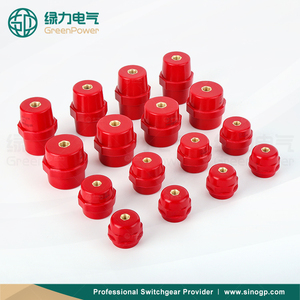

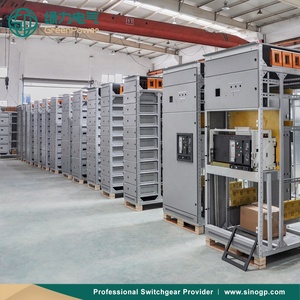























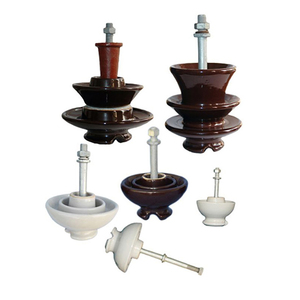





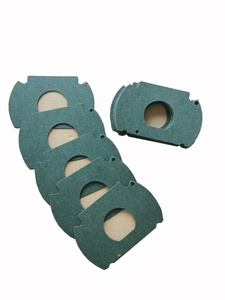
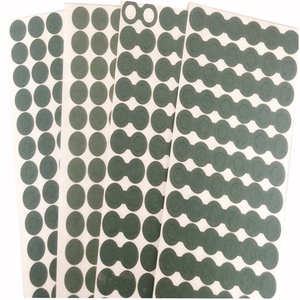













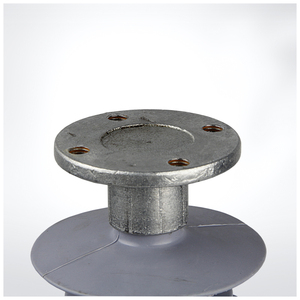

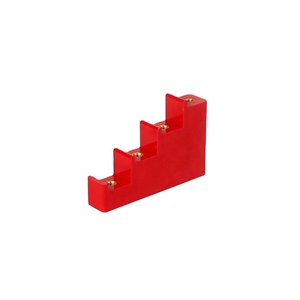
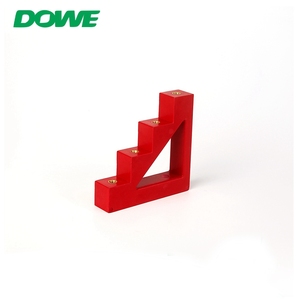







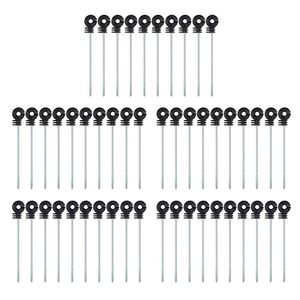


















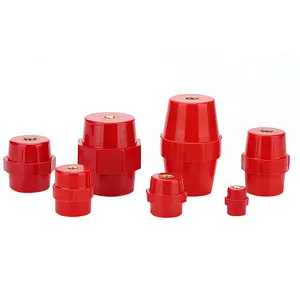






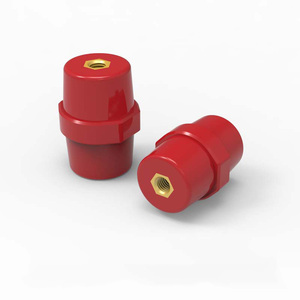









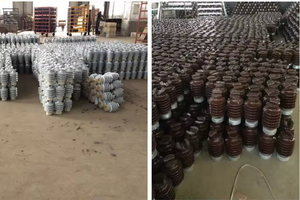


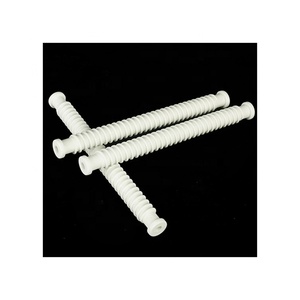






























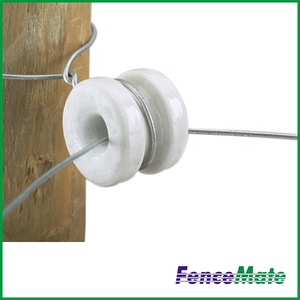










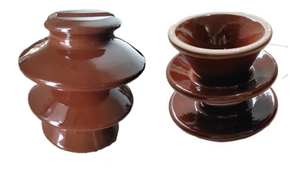



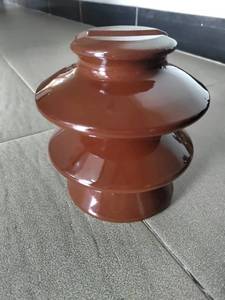









Electrical insulators are usually made of porcelain, glass, plastic, and rubber compounds. They are categorized mainly by application and function within an electrical system. The types include:
Pin Insulators
This type of insulator is known for its widespread application in low- and medium-voltage power lines. The pin insulator holds the conductor on the pole to ensure it stays suspended. In addition, it prevents electricity from flowing to the ground. Manufacturers usually make them from porcelain and toughened glass. This material can easily endure weather elements and electrical discharge.
Suspension Insulators
Engineers use suspension insulators in high-voltage transmission lines. They manufactured these suspension insulators from multiple insulating units hung together to form a chain-like structure. This design allows the conductor to be suspended securely between transmission towers. Porcelain, glass, and polymer are the most common materials for suspension insulators. Further, each unit in the chain can be removed or added. This feature gives users the flexibility to adjust the insulation according to the line's operating voltage.
Strain Insulators
Strain insulators are a common sight in areas where power lines need to change direction or endure tension. Engineers often use them where electrical conductors must be securely fastened to pylons. This function prevents sagging and maintains proper clearance. Users often make strain insulators from several materials. These include porcelain, glass, and composite polymers.
Strength Insulators
Strength insulators are purely mechanical insulators. They do not offer any electrical insulation. Instead, they uphold electrical insulators. The electrical insulators are the load-carrying components that the conductors are placed on. Therefore, these insulators must have good electrical properties. Common materials for strength insulators include porcelain and glass. Occasionally, engineers use metals with insulating coatings.
Composite Insulators
Composite insulators offer a lighter alternative to porcelain and glass insulators. In addition, these composite insulators are more durable against environmental conditions. Therefore, it makes them suitable for power lines in areas prone to severe weather. Users have also fitted these insulators with hydrophobic coatings. This feature helps in self-cleaning and reducing contamination discharge. They also have better resistance to vandalism and breakage. This is unlike traditional insulators, which are usually more fragile.
Electrical insulation has a wide variety of practical applications. These include:
Use in Power Transmission and Distribution
Insulators play a critical role in maintaining the safety and reliability of electrical grids. Insulators support and isolate conductors. They do this by preventing electrical currents from escaping to the ground or other infrastructure. This function ensures that power remains securely transmitted throughout urban and rural settings. Suspension and strain insulators are common in transmission lines. Conversely, pin insulators are prevalent in distribution lines.
Electricity Generation
Manufacturers use insulation materials in generators to differentiate electrical components. These components include stators, rotors, and windings. In addition, insulation maintains operational efficiency and prevents energy loss. Users should have quality electrical insulation to ensure the safety of personnel. They also prevent overheating and equipment failure. For instance, melting or burning will occur if components in electric generators without proper electrical insulators overheat.
In the Manufacturing of Capacitors
Insulators are essential in capacitor construction. They act as a dielectric separating conductive plates and enabling the storage of electric charges. Without insulators, capacitors would not function as energy storage devices. This is because the electric current could easily pass through the plates to the ground. It would not be able to accumulate within the capacitors. Users are advised to select suitable insulation materials. It ensures capacitors can operate effectively at the desired voltage ratings. More importantly, they should ensure they maintain minimal energy dissipation.
Use in Electric Motors
Insulators have an important role in electric motor components. These include windings, stators, and rotors. They help dissipate heat and make sure a smooth operation is always in place. Moreover, quality insulation will help improve energy efficiency in electric motors. This is done by minimizing energy loss during conversions. In addition, degradation of insulation will eventually cause short circuits. It will, therefore, lead to motor failure and expensive replacement costs. Therefore, always ensure quality electrical insulator coating to enhance electric motor longevity.
In the Manufacturing of Circuit Boards
Insulators are critical components in printed circuit boards (PCBs). They provide a medium to separate conductive traces and components on PCBs. PCBs are important elements in electronic devices. Insulation ensures that the electric current only flows to intended pathways. This is within devices like smartphones, computers, and industrial machinery. Without insulation, electric current will randomly disperse. This will cause device malfunction, components damage, and potential fire hazards.
Electrical insulators have considerable longevity. This makes them less susceptible to element exposures. However, regular maintenance and inspections are important to ensure they last longer. Here are a few tips on durability and maintenance:
Checking for Physical Damage
Users should regularly check for visible damage in electrical insulators. Damage like cracks, chips, or severe weathering will impact the electrical insulator not working properly. Furthermore, vandalism may damage them too. Insulators that have photodegradation will develop cracks or brittleness over time. Therefore, it is important to replace these damaged insulators as soon as they are spotted.
Regular Testing
Electrical pollution commonly contaminates electrical insulators. Regular testing helps detect surface contamination. These pollutants can lead to premature insulator failure. Insulators exposed to contaminating substances like salt, dust, and industrial chemicals will degrade faster. Use thermographic inspections and partial discharge detection methods. They are useful tools for identifying insulation failure before it becomes critical.
Cleaning Insulators
Cleaning helps improve the performance of electrical insulators that have accumulated deposits on them. High-pressure water sprays are an effective cleaning method. They reduce contamination and improve insulator effectiveness. In addition, users should consider using hydrophobic coatings on composite insulators. This feature will help prevent pollution and offer self-cleaning properties.
Inspect Hardware and Fittings
Loose hardware, damaged fittings, or worn-out insulator ties can instantly lower insulator performance. This will cause the conductor to sag, leading to undesirable clearance. Proper maintenance and inspection of associated hardware will ensure the insulator behaves as it should all the time.
Use Protective Measures
Electrical insulators are prone to damage from extreme weather, wildlife, and human activities. To reduce this risk, users should consider installing protective devices like animal guards or lightning arresters. Furthermore, choosing insulators with superior mechanical strength will ensure they withstand severe weather conditions.
There are a few factors buyers or businesses should consider when purchasing electrical insulators. Here are some of them:
Material
Electrical insulators are manufactured using various materials. These materials have unique benefits and properties. For instance, porcelain insulators have superior mechanical strength. They are also highly resistant to electrical discharge. Therefore, they are heavy-duty and great when used in industrial applications. On the other hand, glass insulators are great at weathering. They offer visual contamination inspection. Lastly, composite insulators are lighter and offer better pollution resistance.
Insulator type
There are many types of electrical insulators. They include pin, suspension, strain, and post insulators. Each type has unique advantages and disadvantages depending on the electrical application. For instance, a suspension insulator is ideal for high-voltage applications. While electrical post insulators are found in electrical distribution systems. In addition, strain insulators are useful in tensioning power lines. Understanding the function of each one will help buyers make wise purchases.
Load and Voltage Rating
One of the main functions of electrical insulators is to safely handle electrical loads and voltage levels. Insulators that are applied in high-voltage areas must have high voltage ratings. Going for insulators with greater load-bearing capacity in tension-critical applications is important. Using lower-rated insulators in high-voltage or heavier loading applications will cause failure. This, in turn, will create safety risks.
Environmental Conditions
The operational environment greatly impacts the performance of electrical insulators. Take manufacturers that use insulators in areas prone to extreme temperatures, humidity, or pollution. They often opt for types manufactured using materials that withstand these environmental factors. Such as composite insulators. They have superior resistance to UV radiation and saline environments. Moreover, manufacturers using insulators in areas with high biological activity will likely choose materials like porcelain. They are not only easy to install but also have biological tampering protection.
Maintenance and Inspection
The ease of maintenance and inspection are factors that influence the type of electrical insulator one will opt for. For instance, glass insulators offer visual pollution and quick inspections. This helps reduce maintenance time and costs. Moreover, composite insulators are less likely to suffer mechanical damage during installation. Therefore, they are maintenance-free in the long run.
Manufacturers commonly use suspension insulators in high-voltage transmission lines. They offer great safety and stability. Therefore, they are the most ideal for high-voltage applications.
The operational environment greatly impacts how long electrical insulators will last. Insulators exposed to extreme temperatures and humidity will degrade faster. Therefore, it is important to select one fabricated with materials that can withstand the environmental condition of that area.
The main role of electrical insulators is to provide insulation in an electrical system. This will prevent electrical current from passing through unwanted pathways. For instance, to the ground or through conductive materials.
Routine maintenance of electrical insulators should be done at least once a year. However, maintenance frequency really depends on many factors. These factors include environmental conditions, pollution levels, and the voltage rating of the electrical system.
Electrical insulators are mainly manufactured using porcelain, composite materials, and glass. Composite materials are more commonly used due to their lightweight and superior resistance to environmental factors. On the other hand, porcelain and glass have resistance to mechanical strength.